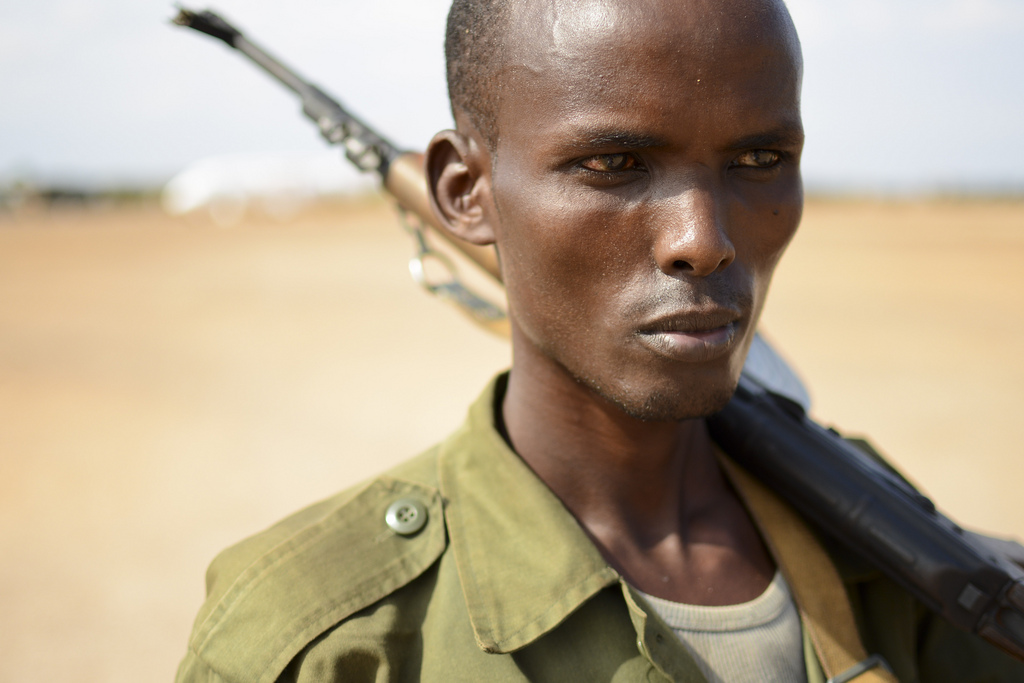Week in review
January 18, 2018

A member of the Somali National Army walks across the runway at Kismayo International Airport.
THE SHABAB TERRORIZES KENYA. On Tuesday, Shabab militants attacked a hotel-office complex in Nairobi, Kenya. Though the attack was initially reported as having caused 14 fatalities, that number has grown to 21 in the ensuing days. One of the assailants was a suicide bomber, while others used guns and grenades to wreak havoc in the complex. The attack came on the eve of an expected verdict in the trial of three Shabab men accused of participating in a similar terror attack in the Nairobi's Westgate shopping mall in 2013. The Shabab are an organization based in neighbouring Somalia who have for years fought the United Nations backed government in Mogadishu in attempt to impose their strict policies of Islam.
ANOTHER CANADIAN ARRESTED AMID SINO-CANADIAN DIPLOMATIC TENSIONS. Robert Schellenberg, a Canadian arrested in 2014 for drug smuggling in China, was handed a death sentence this week amid rising diplomatic tensions between Canada and China. Schellenberg has a criminal history in Canada for drug related charges and has received two jail sentences in his home province of British Columbia, but he has denied all charges levelled against him by Chinese authorities. He was first arrested in 2014, along with two other Chinese nationals, in connection to a drug smuggling operation attempting to move methamphetamines from Dalian, a city in Northern China, to Australia. He appealed his original sentence of 15 years in jail on Monday where the judge determined that his original sentence was too lenient and he was handed the death penalty. His sentence is perhaps a symptom of poor timing as Canada’s diplomatic relationship with China has suffered since the December arrest of Chinese telecom company Huawai’s CFO in Vancouver by Canadian Authorities. This sparked reciprocal arrests by Chinese authorities of two Canadians accused of endangering national security in China. Prime Minister Trudeau has accused China of arbitrarily applying the death penalty in Schellenberg’s case and Schellenberg’s lawyer told reporters that given the lack of new evidence that was presented at his appeal the death penalty was unwarranted in his case.
THERESA MAY LOSES BREXIT VOTE, SURVIVES NO-CONFIDENCE MOTION. MPs of the British House of Commons rejected the Prime Minister’s proposed deal on Brexit Tuesday, with 432 votes against and only 202 for. This defeat is the most lopsided for a government in modern British history. The next day, May faced a no confidence vote, which she won with 325 votes to 306. Tory Brexiteers and the Democratic Unionists in Ireland, both of which despised the deal, decided to support their Prime Minister rather than plunge the country into further chaos in the form of a snap general election. The U.K. is legally required to leave the EU on March 29, whether a deal is in place or not. Without a deal to create a means of transition, the country may face a myriad of troubles regarding the sudden dissolution of free trade and free movement of people. While the House has shown it is unified in opposition to the deal May struck, it is divided on the alternative. Some seek a second referendum, others a new, less conciliatory deal with the EU. With only weeks remaining and her government on the brink of falling apart, it is now more than ever that Theresa must call upon all her political skills.
PROTESTS IN SUDAN. Thursday marked the latest flashpoint in a series of protests in Sudan. Demonstrators in multiple cities across Sudan have been calling for the resignation of President Omar al-Bashir since December 19th. On Thursday, multiple news organizations reported that security forces fired live bullets and tear gas into a crowd of demonstrators in the capital city of Khartoum. A doctor and a 14-year-old girl have been confirmed dead so far. Well-known Sudanese journalist Faisal Mohammed Salih was also arrested.m In total, over 40 people have died as a result of the protests since December.
OSAP CHANGES OVERSHADOW ONTARIO TUITION CUTS. The Ontario Progressive Conservative government has made plans to actively eliminate free tuition for students from low-income families, with an apparent remedy being a subsequent cut in tuition fees for everyone. Currently, the Ontario Student Assistance Plan (OSAP) provides grants and loans to students in need of financial assistance, however, the PC’s claim that such a program remains unsustainable. The previous Liberal government increased OSAP’s influence and made it possible for low-income students to attend college or university free of initial charge. However, the auditor general found last month that the program would cost the province $2 billion annually by 2020-21. NDP MPP Chris Glover claims that students will suffer as post-secondary institutions are forced to absorb this tuition cut, saying “they are going to be paying for these changes with larger class sizes and fewer professors; they’re going to be charged interest as soon as they graduate; their grants and loans are going to be cut” Glover said. “And that could mean that some students aren’t able to pursue programs that they wanted to pursue or pursue the careers that they wanted to”.